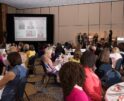
Chrystia Freeland – U.S. Managing Editor, Financial Times

The Accidental Journalist: Financial Times U.S. Managing Editor Chrystia Freeland tells how to survive the economic crunch – and looks at the future of the newspaper industry.
By Rebecca Wetherbee
“It’s a time to be frugal, because we don’t know where the economy is going,” says Chrystia Freeland, who has been U.S. managing editor of the Financial Times for two and a half years. A Harvard grad with degrees in Russian history and literature – and a master’s from Oxford University – Freeland calls herself an “accidental journalist.” She got her break in journalism working as a freelancer in Ukraine. A summer trip to Kiev in the spring of 1991 sparked her passion for reporting, as the collapse of the Soviet Union provided her with a wealth of material and the inspiration to pursue journalism full time. Since then, she has published a book called Sale of the Century: The Inside Story of the Second Russian Revolution (Crown Books, 2000).
PINK caught up with her as recent U.S. unemployment figures and other economic indicators show continuing weakness.
PINK: What advice do you have for women struggling in this economy?
Chrystia Freeland: One very powerful trend we’re seeing is a really big gap between the upper class and everyone else. It’s a winner-take-all economy. People at the top are still doing well, but it’s hard for everyone else. Some data has shown that the only group whose incomes have grown are those with advanced degrees – lawyers, doctors, MBAs. We’re living in a time when being very highly skilled is extremely important. And you have to be able to operate in a global context. Companies are looking for people who are willing to do that, who speak languages and understand other cultures – and are willing to move.
PINK: What’s the biggest challenge you’re facing right now?
C.F.: To anyone working in a newspaper-based organization, the challenge is figuring out a business model that will sustain our news organization in the Internet age. We have a good website, and we’re able to charge people money to subscribe to the site. And because we have such a targeted, valuable audience, we’re able to charge a lot for our online ads. But it’s changing our environment, and we’re trying to get it right like everyone else. I welcome all the user-generated content the Internet has made available. But it’s still important to have professional journalists – paid to sit back and sift through and collect things – to bring us news. It’s the job of editors and publishers to make that economically sustainable right now. But people are still reading books, magazines and newspapers and listening to the radio. So I don’t think old media will go away entirely.
PINK: You call yourself an “accidental journalist.” How did that happen?
C.F.: I was supposed to go to Oxford [University] in the fall of 1991. But I had a few months to kill between undergrad and Oxford, so I went to Ukraine. My late mother was Ukrainian, and I had spent an academic year in Kiev. While I was there, the Soviet Union started to fall apart. All of a sudden my plan to write a few freelance pieces became a full-time job. When I was at Harvard, I met some older journalists who told me that it was actually possible to make a living as a stringer. Who knew that you could just move to a weird place like Kiev and start writing articles? That was very valuable to me. And I ended up doing that for almost three years. It was thrilling and rewarding – and scary – to be doing a first draft of history. I was writing stories that I knew, if I hadn’t written them, no one else would have. There weren’t a lot of Western journalists in Ukraine. So I was contributing to history. That got me hooked on journalism. I think what we do is important to how our society functions.
PINK: You’ve lived in Russia, London, Italy, Ukraine and Canada. What unique lessons have you learned by living abroad?
C.F.: I think [my travels] are really essential for me to do my job. Financial Times’ core mission is to offer a global view of business and geopolitics. That is more valuable today, I think, than it ever has been. If you’re interested in public affairs and public policy, you have to understand your work in an international context. Just thinking of things within national boundaries is too narrow.
PINK: What are some important global trends right now?
C.F.: The obvious one is continuing globalization of the economy. Now we’re seeing the effect of globalization and economic growth – particularly with the increase in prices for oil and agricultural commodities. It’s a positive, benign trend with nasty side-effects. People who used to be really poor in India and China can eat better now. That’s great, but it makes commodities more expensive for the rest of us. A second trend is what I call the age of authoritarianism. For years, as you’ve looked around, you’ve seen the world getting more democratic. I think that’s been reversed in some important parts of the world – most significantly in Russia. A lot of people hoped hosting the Olympics in China would make them be more democratic. Instead it just let them say to the world and to themselves that their somewhat open economy and closed political system are sustainable.
PINK: How do you balance your work with your family life?
C.F.: I ask that of women who are a million times more accomplished than I am all the time. The best answer I got was, “Of course I don’t,” and I think that’s true of all of us. I try to remind myself how lucky I am to have a job that I truly love – and a great family. The most important thing to me, although not the thing I spend the most time doing, is to be a mother. Because your children don’t choose to be born. You choose to have them. They are at the center of everything for me. My single biggest goal is to try to be as good a mother to my daughters as my mother was for me. I’m pretty far from achieving that. My mother, who died last summer, was terrific – my hero and role model. I’m not as patient with my children as I’d like to be. But I’m trying – and that’s all I can do. [My daughters] give me my most robust and most constant reviews – about how I take care of them. I’m not normally organized enough to make a hot breakfast for my kids. I had to do an early TV show this morning, so I was home by 6:30. I made my kids fried eggs and toast for breakfast. My 7-year-old said I was a very good mother – this morning.
PINK: What was your biggest career mistake?
C.F.: I have two regrets. I wish I’d been a more serious student, both as an undergraduate and at Oxford. Now as I become older, I realize that those are times when you’re allowed to just read and think and develop skills. I wish I’d developed that more. Also, I wrote a book when I left Moscow about the rise of the Russian oligarchs and Russian capitalism. I wish now that I’d taken a year off and written it. I think I could have written a better book. But I was really excited about my new job at the FT, and I was afraid if I took that time off I would lose it.
PINK: What’s the best advice you’ve received?
C.F.: The advice I find myself repeating quite a lot to the younger reporters is something I heard from the secretary of the Treasury, Henry M. Paulson: “Don’t be a career engineer.” Don’t feel that you have to know what the next step and the next step and the step after that will be. I don’t think his intent was to say that we should be aimless, but we don’t have perfect foresight. We don’t know for sure what the best opportunities will be. And we don’t have perfect control. It’s important to be flexible and to be able to accept opportunities if they come up, and not be too anxious about getting to a particular place at a particular time. And Indra Nooyi, the CEO of Pepsi, whom I really admire, said, “We should impute positive intent on people.” It’s very easy to get caught up in thinking that the people you’re dealing with are being critical of you, and sometimes that’s true, of course; but her point was that it’s not always true – and sometimes you actually make it true by thinking that way.
PINK: How do you define “success”?
C.F.: Having a positive impact on the people I love, the people I work with and, ideally, on the world. I do that by showing up. I’m the mother of two daughters, and I don’t regret at all that I also have a job. It’s very healthy for them to see me working. My mother was a lawyer, and sure I can remember moments in my childhood when I wish she was there. But I never felt she failed me even for an instant as a mother. It made it much easier for me to have a job myself. I’ve never felt any existential angst about it. That’s how I grew up. And it’s good for my girls to see me working. They’re already planning their jobs. And they plan that I will be their babysitter.
Recommended
-
Do You Have The Imposter Syndr...June 18th, 2022
-
1 Key Email Marketing Tips For...January 6th, 2022
-
Six Tips For Choosing A PEO Se...September 20th, 2021
-
Top Women Profiles, PINK Lists...July 20th, 2021
-
Black Lives Matter. PINK Stand...June 15th, 2020















